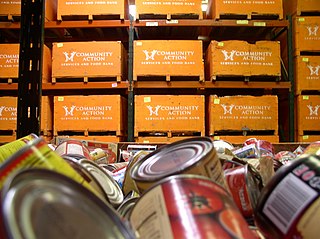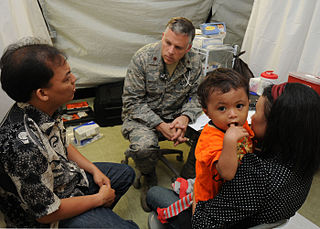Related Research Articles

Organizations which are independent of government involvement are known as non-governmental organizations or non-government organizations, with NGO as an acronym. NGOs are a subgroup of organizations founded by citizens, which include clubs and associations that provide services to their members and others. NGOs are usually nonprofit organizations, and many of them are active in humanitarianism or the social sciences. Surveys indicate that NGOs have a high degree of public trust, which can make them a useful proxy for the concerns of society and stakeholders. However, NGOs can also be lobby groups for corporations, such as the World Economic Forum. According to NGO.org, "[an NGO is] any non-profit, voluntary citizens' group which is organized on a local, national or international level ... Task-oriented and driven by people with a common interest, NGOs perform a variety of service and humanitarian functions, bring citizen concerns to Governments, advocate and monitor policies and encourage political participation through provision of information."

Cross-cultural communication is a field of study that looks at how people from differing cultural backgrounds communicate, in similar and different ways among themselves, and how they endeavor to communicate across cultures. Intercultural communication is a related field of study.

The Magen David Adom is Israel's national emergency medical, disaster, ambulance and blood bank service. The name means "Red Shield of David". Since June 2006, Magen David Adom has been officially recognized by the International Committee of the Red Cross (ICRC) as the national aid society of the State of Israel under the Geneva Conventions, and a member of the International Federation of Red Cross and Red Crescent Societies. MDA has a dedicated medical emergency phone number in Israel, 101. MDA can become an auxiliary arm of the Israel Defense Forces during times of war.
Execution in computer and software engineering is the process by which a computer or virtual machine executes the instructions of a computer program. Each instruction of a program is a description of a particular action which to be carried out in order for a specific problem to be solved; as instructions of a program and therefore the actions they describe are being carried out by an executing machine, specific effects are produced in accordance to the semantics of the instructions being executed.

A blood donation occurs when a person voluntarily has blood drawn and used for transfusions and/or made into biopharmaceutical medications by a process called fractionation. Donation may be of whole blood, or of specific components directly. Blood banks often participate in the collection process as well as the procedures that follow it.

Community service is unpaid work performed by a person or group of people for the benefit and betterment of their community without any form of compensation. Community service can be distinct from volunteering, since it is not always performed on a voluntary basis and may be compulsory per situation. Although personal benefits may be realized, it may be performed for a variety of reasons including citizenship requirements, a substitution of criminal justice sanctions, requirements of a school or class, and requisites for the receipt of certain benefits.
Interpreting is a translational activity in which one produces a first and final translation on the basis of a one-time exposure to an expression in a source language.

Latter-day Saint Charities is a branch of the welfare department of The Church of Jesus Christ of Latter-day Saints. The organization's stated mission is to relieve suffering, to foster self-reliance for people of all nationalities and religions, and to provide opportunities for service.

The American Red Cross (ARC), also known as The American National Red Cross, is a humanitarian organization that provides emergency assistance, disaster relief, and disaster preparedness education in the United States. It is the designated US affiliate of the International Federation of Red Cross and Red Crescent Societies and the United States movement to the International Red Cross and Red Crescent Movement.
The Japan National Tourism Organization, JNTO, provides information about Japan to promote travel to and in the country. It was established in 1964 and its headquarters are in Yotsuya, Shinjuku-ku, Tokyo. The JNTO operates Tourist Information Centers (TICs) as well as a website. It disseminates information about transportation, lodging, food and beverage, and sight-seeing as well as published tourism statistics and market reports. It also provides support for international conventions and incentive events.

Global Youth Service Day (GYSD), originally launched and known as National Youth Service Day in the United States, is a coordinated annual event which voluntary gathers young people around the world in conducting community service, service learning, and youth voice activities that benefit their communities, their countries, and the world. Activities are organized in more than 100 countries each April to help mark the celebrations, and engage millions, making it the largest annual celebration of young volunteers.
A translator or programming language processor is a generic term that can refer to anything that converts code from one computer language into another. A program written in high-level language is called source program. These include translations between high-level and human-readable computer languages such as C++ and Java, intermediate-level languages such as Java bytecode, low-level languages such as the assembly language and machine code, and between similar levels of language on different computing platforms, as well as from any of the above to another.
An interpreter officer or army interpreter is a commissioned officer of an armed force, who interprets and/or translates to facilitate military operation. Interpreter officers are used extensively in multinational operations in which two or more countries that do not share a common language are undertaking a joint operation, or expeditionary missions in which the communication with the local population is crucial but limited by lack of language proficiency among the expeditionary force personnel. Interpreter officers also work in the intelligence gathering and analysis though in many countries, civilian analysts are used instead of the officers in active duty.
Telephone interpreting connects human interpreters via telephone to individuals who wish to speak to each other but do not share a common language. The telephone interpreter converts the spoken language from one language to another, enabling listeners and speakers to understand each other. Interpretation over the telephone most often takes place in consecutive mode, which means that the interpreter waits until the speaker finishes an utterance before rendering the interpretation into the other language.

Community Action Services and Food Bank (CASFB), located in Provo, Utah, is a non-profit organization that serves the low-income population of Utah, Summit, and Wasatch counties and focuses on the operation of programs that help alleviate poverty. It was founded in 1967 following the signing of the Economic Opportunity Act in 1964 by President Lyndon B. Johnson and is one of more than 1,000 independent Community Action Agencies across the country. It is sponsored by United Way of Utah County.

The Rosetta Foundation is a nonprofit organization that promotes social localisation, i.e. making information available to individuals around the world irrespective of their social status, linguistic or cultural background, and geographical location.
Austin Area Translators and Interpreters Association (AATIA) is a professional organization based in Austin, Texas, and affiliated with the American Translators Association. The AATIA was founded in 1985 and incorporated as a non-profit organization in 1994. It promotes the translation (written) and interpretation (spoken) services of its members through advertising and community outreach. It also educates the public about these language-based professions.

Volunteering is a voluntary act of an individual or group freely giving time and labour for community service. Many volunteers are specifically trained in the areas they work, such as medicine, education, or emergency rescue. Others serve on an as-needed basis, such as in response to a natural disaster.

Cultural competence in healthcare refers to the ability for healthcare professionals to demonstrate cultural competence toward patients with diverse values, beliefs, and feelings. This process includes consideration of the individual social, cultural, and psychological needs of patients for effective cross-cultural communication with their health care providers. The goal of cultural competence in health care is to reduce health disparities and to provide optimal care to patients regardless of their race, gender, ethnic background, native languages spoken, and religious or cultural beliefs. Cultural competency training is important in health care fields where human interaction is common, including medicine, nursing, allied health, mental health, social work, pharmacy, oral health, and public health fields.
International volunteering is when volunteers contribute their time to work for organisations or causes outside their respective home countries. In most such cases, volunteers work in developing countries on international development programmes with local volunteer organisations that conduct activities such as health promotion, education and environmental conservation.
References
- ↑ Rowe, Lindsey (August 3, 2004). "Volunteer translators break down barriers". Seattle Post Intelligencer. Retrieved 2008-04-18.
- ↑ "ATA and American Red Cross Recruit Volunteer Interpreters". American Translators Association. Archived from the original on 2007-07-01. Retrieved 2008-04-18.
- ↑ Kilgannon, Corey (2005-03-15). "Queens Hospitals Learn Many Ways to Say 'Ah'". The New York Times . pp. B1. Retrieved 2008-04-19.
| This language-related article is a stub. You can help Wikipedia by expanding it. |
| This article about a translators association or other related organization is a stub. You can help Wikipedia by expanding it. |